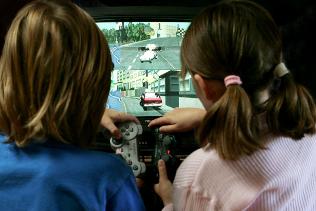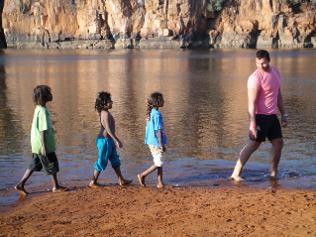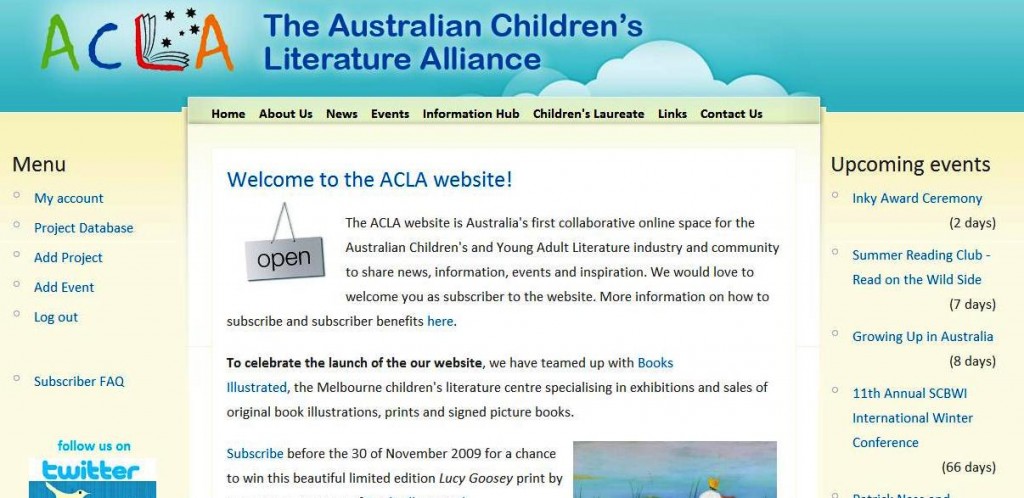Apple is set to announce their next big thing on January 26 (now ‘slated’ for January 27). Variously called the iSlate, the iGuide or generically called ‘the tablet’, rumours abound what it will do precisely, but many writers seem to agree that it will at least do for books what the iPod did for music. However, a colour eReader with internet access, video, etc. is seen as being just the beginning. As Apple get so many things oh so right, what more can we expect? A few experts reveal their thoughts.
Jesse McDougall reports in the Huffington Post that Apple’s iSlate will be a Kindle killer:
When it comes to the launch of new and exciting techno-gadgets, I–and perhaps, we all–have been spoiled by Apple. Yes, they’ve gotten it wrong on occasion, but so often, they get it so right. They’ve repeatedly raised the bar, and our expectations. Perhaps that’s why, when I first saw the unauthorized, leaked images of Amazon’s first Kindle on the web all those years ago, I thought surely they were the creation of an internet ne’er-do-well. I laughed, because I thought I got the joke. “Yeah!” I said. “That DOES look like it’s from 1980! Good one, you internet pranksters you.”
But so it was.
In the days of high-speed streaming video, 5-second song downloads, 30″ computer monitors, and a nation of media addicts, Amazon released this.
Amazon’s Kindle (along with all the other faux-paper e-ink readers) ignores the fact that all media is evolving–books included. These e-ink readers are nothing more than a cautious step between the old and the new. They’re too married to the formatting and failures of their paper predecessors to take full advantage of what’s possible. They’ll never be as good as paperbacks for quiet, un-powered reading. And they’ll never be as good as computers for multimedia content. Why offer a device that offers a poor version of two experiences?
By releasing an e-reader so hopelessly tied to the paper, Amazon gave Apple an opening to provide something better. If the latest swirl of rumors is true and Apple plans to release a tablet computer, or iSlate, early next year, you can bet your life it will put the Kindle to shame when it comes to digital content delivery. Any e-ink device simply will not be able to compete. I’m not going to reveal any names, but I have it on very good authority, for example, that–unlike the Kindle–the new Apple tablet will, indeed, have a color screen. Might it also … play video?! (Please pardon the sarcasm.)
Book publishers are feverishly searching for the best ways to pour their content into the new digital stream. And rightly so. I’ve argued here in the past that book publishers, as producers of a continuous stream of high-quality and edited content, are perfectly suited to capitalize on the new opportunities presented by the digital content revolution. Selling e-books has long been the most accepted method–and though I have my reservations–I wouldn’t necessarily disagree. I would argue, however, that the best e-books are certainly not Kindle e-books.
Book content should no longer be imprisoned by the limitations of paper. Digital books should include author interviews, instructional videos, pop-up definitions of esoteric terms, instant foreign translations, optional soundtracks, links to helpful web sites, and anything else publishers and authors can dream up to increase the value and effectiveness of their content.
What the rumored Apple iSlate represents for publishers and e-book readers is the ability to break free from the limitations of paper–which were so dutifully copied by Amazon and Sony–and provide book content to readers on a portable device with a screen big enough to be reasonable for reading long-form content.
I understand the arguments for the e-ink format: the non-back-lit screen is easy on the eyes, easy on battery life, etc. And since we spend upwards of ten hours a day staring at glaring screens–whether 30″ wide or glowing in your pocket– I can understand the argument for not wanting to read the latest vampire novel off yet another backlit screen. When I desire such a quiet reading experience I pick up the paperback. It is still the best at what it does. No electronic reader could ever truly duplicate the experience of reading off paper. So why try? When building a digital reader, build something different. Build something that offers book readers new material–and publishers a new revenue stream. With the coming of the iSlate, it looks like Apple may have finally done just that.
This was originally published on Jesse’s blog.
Jenny Luca passed on this lengthy but must-read post by John Gruber on Daring Fireball:
The Tablet
Thursday, 31 December 2009
Another former Apple executive who was there at the time said the tablets kept getting shelved at Apple because Mr. Jobs, whose incisive critiques are often memorable, asked, in essence, what they were good for besides surfing the Web in the bathroom.
—”Just a Touch Away, the Elusive Tablet PC”, The New York Times, 4 October 2009
Here’s the thimbleful of information I have heard regarding The Tablet (none of which has changed in six months): The Tablet project is real, it has you-know-who’s considerable undivided attention, and everyone working on it has dropped off the map. I don’t know anyone who works at Apple who doubts these things; nor do I know anyone at Apple who knows a whit more. I don’t know anyone who’s seen the hardware or the software, nor even anyone who knows someone else who has seen the hardware or software.
The cone of silence surrounding the project is, so far as I can tell, complete.1
The situation is uncannily similar to the run-up preceding the debut of the original iPhone in January 2007, including many of the same engineers and software teams at Apple — such as those who built the iPhone Mail, Calendar, and Safari apps — disappearing into a black hole. The iPhone remained a secret until Steve Jobs took it out of his jeans pocket on stage at Macworld Expo. All of which is to say that what follows is my conjecture. Pure punditry, not one of those smarmy “predictions” where I know full well in advance what’s going to happen.
I have a thousand questions about The Tablet’s design. What size is it? There’s a big difference between, say, 7- and 10-inch displays. How do you type on it? With all your fingers, like a laptop keyboard? Or like an iPhone, with only your thumbs? If you’re supposed to watch video on it, how do you prop it up? Holding it in your hands? Flat on a table seems like the wrong angle entirely; but a fold-out “arm” to prop it up, à la a picture frame, seems clumsy and inelegant. If it’s just a touchscreen tablet, how do you protect the screen while carrying it around? If it folds up somehow, how is it not just a laptop — why not put a hardware keyboard on the part that folds up to cover the display? (Everyone I know at Apple refers to it as “The Tablet”, but so far as I can tell, that’s because that’s what everyone calls it, not because anyone knows that it actually even is, physically, a tablet. And “The Tablet” most certainly is not the product name.) If it’s too big to fit in a pants pocket, how are you supposed to carry it around? And but if it doesfit in a pants pocket, how is it bigger enough than an iPod Touch to justify existing? And so on.
But there’s one question at the top of the list, the answer to which is the key to answering every other question. That question is this: If you already have an iPhone and a MacBook; why would you want this?
The epigraph I used to start this piece — the bit about Steve Jobs demanding that a tablet be useful for more than just reading on the can — indicates that Apple will release nothing without such an answer. I agree that such an answer is essential.
Successful new gadgets always seem to occupy a clearly defined place alongside, or replacing, existing devices. The Flip filled a previously empty niche for a small, cheap, simple video camera. How was the iPod better than existing portable music players? It fit 1,000 songs in your pocket, with a fun interface that let you find them easily. Why buy an iPhone to replace your existing mobile phone? Because there was a clear need for a modern handheld general-purpose computer.
But how much room is there between an iPhone (or iPod Touch) and a MacBook (or other laptop computer, running Windows or Linux or whatever)? What’s the argument for owning all three?
“I’d use it on the couch and lying in bed” is not a good answer. You can already use your iPhone orMacBook on the couch and in bed. It strikes me as foolish to market a multi-hundred-dollar device that people are expected to leave on their coffee table.
“It’s a Kindle killer” is not a good answer. If you think Apple is making a dedicated device for reading e-books and articles, you’re thinking too small. As profoundly reticent as Steve Jobs is regarding future Apple products, when he does speak, he’s often surprisingly revealing. David Pogue asked him about the Kindle a few months ago:
A couple of years ago, pre-Kindle, Mr. Jobs expressed his doubts that e-readers were ready for prime time. So today, I asked if his opinions have changed.
“I’m sure there will always be dedicated devices, and they may have a few advantages in doing just one thing,” he said. “But I think the general-purpose devices will win the day. Because I think people just probably aren’t willing to pay for a dedicated device.”
He said that Apple doesn’t see e-books as a big market at this point, and pointed out that Amazon.com, for example, doesn’t ever say how many Kindles it sells. “Usually, if they sell a lot of something, you want to tell everybody.”
Of course, this is the same Steve Jobs who back in January 2008 told The New York Times’s John Markoff:
“It doesn’t matter how good or bad the product is, the fact is that people don’t read anymore,” he said. “Forty percent of the people in the U.S. read one book or less last year. The whole conception is flawed at the top because people don’t read anymore.”
One could reasonably argue that the “people don’t read” comment, taken at face value, suggests that Apple has no interest in that market, period.
I, however, would square the two remarks as follows: Not enough people read to make it worth creating a dedicated device that is to reading what the original iPod was to music. (Everyone, for practical definitions of “everyone”, listens to music.) But e-reading as one aspect among several for a general-purpose computing device — well, that’s something else entirely.
The pre-Touch iPod was (and remains) an enormous success. It changed the music industry and rejuvenated Apple. But it was and remains a dedicated device; originally focused on audio, now capable of the sibling feature of video.
The iPhone, on the other hand, was conceived and has flourished as a general-purpose handheld computing platform. It was not introduced as such publicly, and is not pitched as such in Apple’s marketing, but clearly that’s what it is. The iPhone was described by Jobs in his on-stage introduction as three devices in one: “a widescreen iPod with touch controls, a revolutionary mobile phone, a breakthrough Internet communicator”. Thus, it was clear what people would want to do with it: watch videos, listen to music, make phone calls, surf the web, do email.
The way Apple made one device that did a credible job of all these widely-varying features was by making it a general-purpose computer with minimal specificity in the hardware and maximal specificity in the software. And, now, through the App Store and third-party developers, it does much more: serving as everything from a game player to a medical device.
Do I think The Tablet is an e-reader? A video player? A web browser? A document viewer? It’s not a matter of or but rather and. I say it is all of these things. It’s a computer.
And so in answer to my central question, regarding why buy The Tablet if you already have an iPhone and a MacBook, my best guess is that ultimately, The Tablet is something you’ll buy insteadof a MacBook.
I say they’re swinging big — redefining the experience of personal computing.
It will not be pitched as such by Apple. It will be defined by three or four of its built-in primary apps. But long-term, big-picture? It will be to the MacBook what the Macintosh was to the Apple II.
I am not predicting that Apple is phasing out the Mac. (On the contrary, I’ve heard that Mac OS X 10.7 is on pace for a developer release at WWDC in June.) Like all Apple products, The Tablet will do less than we expect but the things it does do, it will do insanely well. It will offer a fraction of the functionality of a MacBook — but that fraction will be way more fun. The same Asperger-y critics who dismissed the iPhone will focus on all that The Tablet doesn’tdo and declare that this time, Apple really has f*$ked up but good. The rest of us will get in line to buy one.
The Mac is, and will remain, Apple’s answer to what you use to do everything.
The Tablet, I say, is going to be Apple’s new answer to what you use for personal portable general computing.
Put another way, let’s say instead of a MacBook and an iPhone, you’ve got an iMac and an iPhone, but you also want a portable secondary computer. Today, that portable from Apple (portable as opposed to the iPhone’s mobile) is a MacBook. With The Tablet, you’ll have the option of a device that will more closely resemble the iPhone than the iMac in terms of concept and the degree of technical abstraction.
The Tablet OS
The original 1984 Mac didn’t abstract away the computer — it made the computer itself elegant, simple, and understandable. Very, very little was hidden from the typical user. Mac OS X is vastly more complex technically and conceptually, as it must be due to the vastly increased complexity and capability of today’s hardware. But Mac OS X has always tried to have it both ways: a veneer of simplicity that doesn’t cover the entire surface of the system. The user-exposed file system is a prime example. On the 1984 Mac, the entire file system was exposed, but the entire file system fit on a 400 KB floppy disk. On Mac OS X, the /System/Library/folder, one of many exposed fiddly sections of the file system browsable in the Finder, contains over 90,000 items, not one of which a typical user should ever need to see or touch.
The iPhone OS offers a complete computing abstraction. Under the hood, it’s just as complex as Mac OS X. On the surface, though, it is even more simple and elegant than the original Mac. No technical complexity is exposed. Hierarchyis minimized. It relegates the file system to a developer-level technology rather than a user-level technology. (Did you know the file system on iPhonesis case sensitive?)
But so while I think The Tablet’s OS will be like the iPhone OS, I don’t think it will be the iPhone OS. Carved from the same OS X core, yes, but with a new bespoke UI designed to be just right for The Tablet’s form factor, whatever that form factor will be.
One common prediction I disagree with is that The Tablet will simply be more or less an iPod Touch with a much bigger display. But in the same way that it made no sense for Apple to design the iPhone OS to run Mac software, it makes little sense for a device with a 7-inch (let alone larger) display to run software designed for a 3.5-inch display.
The iPhone OS user interface was not designed in the abstract. It’s entirely about real-world usability, and very much designed specifically around the physical size of the device itself. The size and spacing of tappable targets are designed with the size of human thumb- and fingertips in mind. More importantly, the whole thing is designed so that it can be used one-handed. Even an adult with relatively small hands can go from one corner to the other with their thumb, holding the iPhone in one hand.
Mac OS X apps couldn’t run on an iPhone display because they simply wouldn’t fit, and the parts that did fit would contain buttons and other UI elements that were far too small to be used. Running iPhone software on a much larger display presents the opposite problem: it’s not that the UI couldn’t be scaled to fill the screen, it’s that it would be a waste to do so.
A 7-inch display isn’t twice the size of an iPhone’s, it’s fourtimes bigger in surface area. I’m not sure even Shaquille O’Neal could hold a 7-inch iPod Touch in one hand and swipe from corner to corner with his thumb. Why would Apple stretch a UI designed to afford for one-handed use on 3.5-inch displays to cover a 7-inch (or larger) display that couldn’t possibly be used one-handed? If Apple’s starting with a hardware size where the iPhone OS can’t be used one-handed, then trust me, they’re designing a new interaction model.
Apple is not in the business of making monolithic OSes that they cram down your throat on as many widely-varying devices as possible. Apple is in the business of making complete products, for which they craft derivative OSes to fit each product. There is a shared core OS. There is not a shared core UI.2
If you’re thinking The Tablet is just a big iPhone, or just Apple’s take on the e-reader, or just a media player, or just anything, I say you’re thinking too small — the equivalent of thinking that the iPhone was going to be just a click wheel iPod that made phone calls. I think The Tablet is nothing short of Apple’s reconception of personal computing.
Pete Cashmore from Mashable explains that Apple expects to sell 10 million tablets in the first year.
Apple expects to sell 10 million tablet computers in the product’s first year, according to a former Google executive.
Lee Kai-fu, founding president of Google China until September 2009, says in a blog post he heard the numbers from a friend.
He added that the Apple tablet (rumors now call it the iSlate or iGuide) will be launched this month at a sub-$1000 price point. He says the device’s 10.1-ich screen makes it resemble a large iPhone.
Lee’s Innovation Worksfund is an investor in iPhone-manufacturer Foxconn, although he denies that the information came from Foxconn or Apple.
Will you buy an Apple Tablet? Let us know in the comments.
[via Bloomberg]
The BBC have also reported that Apple shares have risen on speculation about the new platform and that Apple has booked the Yerba Buena Centre in San Francisco for 26 January (where the iPhone was launched).
Subject to copyright, can you imagine being able to read Andre Agassi’s autobiography Open that has key matches mentioned in the text embedded into the book? (Such as the 1990 French Open Final where he lost because he was so concerned his wig was about to fall off??)
How about reading Michael Jackson’s Moonwalk where he talks about a film clip where he dances like a robot (and the next day children around the world were imitating him).
Not being aware of that song and clip makes the text a little meaningless, but being able to see the clip makes the text so much more meaningful.
What does this mean for libraries, schools and school libraries? Is it the much heralded death-knell for books? Perhaps people will actually read more books when access is easier. However, access to eBooks means that the reader needs some type of machine to read them. Does this mean that access will actually be more difficult for many people due to cost? Will libraries, schools and school libraries provide these eReaders for patrons and students to help bridge the divide? Who would receive the machines? How would that be decided? Will libraries provide access to eBooks via their websites, much like the Overdrive system used by Yarra Plenty Regional Library and Brisbane Libraries that provides online access to mp3 audio books and eBooks? To overcome copyright issues, the mp3s that are downloaded by users are only available on the user’s machine for the normal loan period (say, three weeks) and then it becomes available for another user. Can you see libraries providing this service? What would the ramifications be for those of us in schools? Would the library become purely a service and a state of mind rather than an actual place? If so, what then happens to the community services that libraries provide?
There is certainly much to ponder here for publishers, booksellers and library staff. I would love any comments and thoughts. One thing is certain, more will become clearer once Apple make their announcement in a few weeks. At present, much of this is purely speculation. However, it seems to be an exciting and challenging time for those in the book industry.




